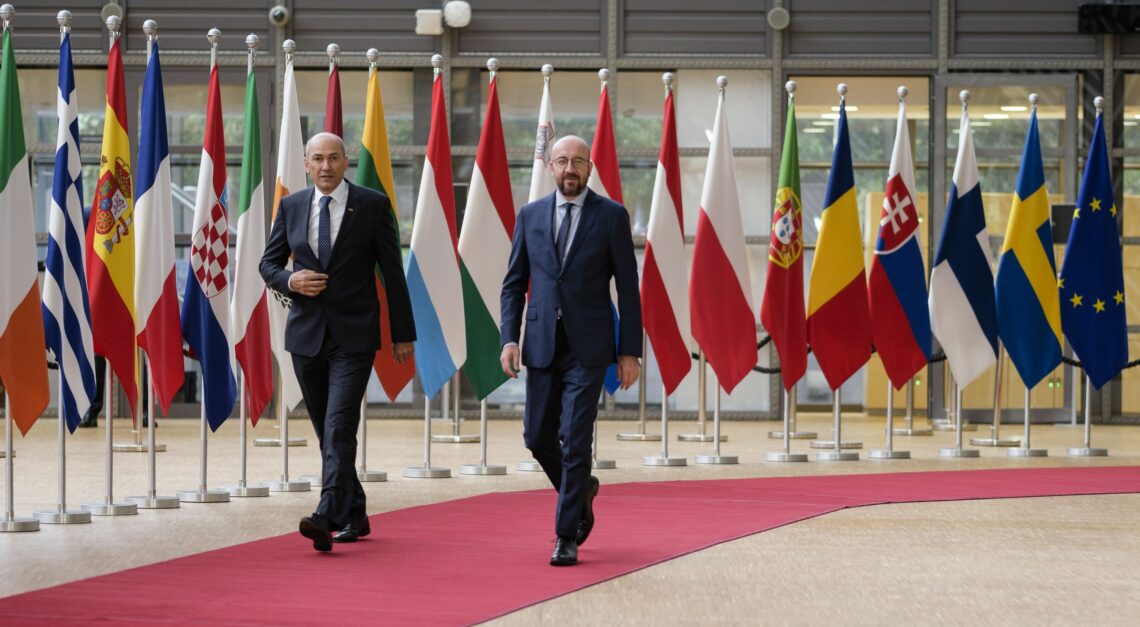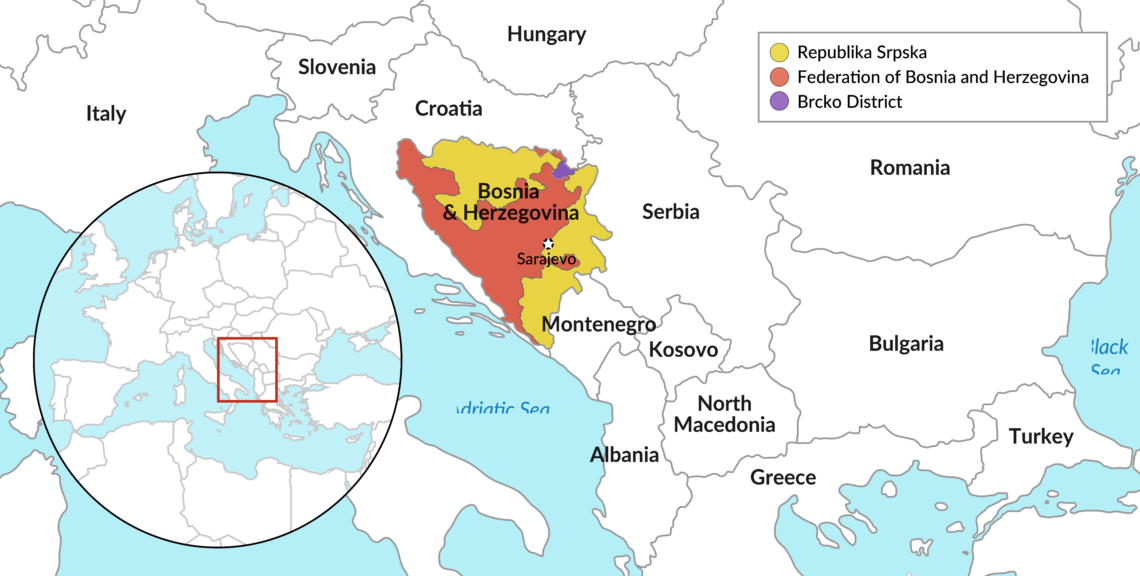The Balkans’ long wait for EU integration drags on
Politics got in the way of Western Balkans countries progressing toward EU integration last year, and this year, membership talks seem out of reach as well. The longer the delay, the greater the opportunity Russia and China will have to make further inroads in the region.

In a nutshell
- The Balkans are making little progress toward EU integration
- More remapping and economic alternatives are being proposed
- Keeping the countries out of the EU could threaten its security
This year began similarly to the last for the Western Balkans and their quest for integration into the EU. Brussels continues to dangle the possibility of accession in front of the six nations, while the drive for enlargement remains stalled. After 22 years of waiting, the region remains in limbo. The EU reneged on its promises to Albania and North Macedonia to start accession negotiations in December, and to the other nations to move forward on their cases, and the situation looks unlikely to change soon.
In fact, some are now calling for “substitutes” for EU integration. The first is political, and constitutes a remapping of the region – again changing its borders. The second is technical and involves creating a free trade zone between the Western Balkans and the EU. Both options could have an enormous impact on both the region and Europe.
Exhausted region
The people of the Western Balkans look to history and fear for their future. For five centuries they were politically separate from the rest of Europe, under the Ottoman Empire and communist rule. Now, they worry they will be left to the political devices of Moscow and Beijing. If Brussels does not work harder to bring the region under its wing, that scenario could materialize, with all the security consequences it would have for the EU’s southeastern border.
After being strung along by the EU for decades and now dealing with the catastrophic effects of the Covid-19 pandemic, the region is exhausted. It still endures numerous bilateral disputes and a broader geopolitical tug-of-war between global and regional powers. Serbia, for example, remains undecided between east and west. Albania and North Macedonia have firmly decided on orienting themselves with Europe and the U.S. – they are both NATO members – yet they remain waiting at the EU’s doorstep. Montenegro, another NATO member, is trying to keep from falling into a Chinese debt trap and to stave off resurgent pressure from Russia.
Five EU member states do not even recognize Kosovo.
Five EU member states do not even recognize Kosovo, which still lacks a visa-free movement scheme with the bloc – something the other countries in the region enjoy. Interethnic strife continues in Bosnia and Herzegovina, risking dissolution of the state itself. As all this is taking place, the EU’s new enlargement methodology, which was adopted last year and was supposed to streamline Western Balkans’ accession processes, has not yet been applied. It remains unclear when and how that will happen.
Portugal is chairing the rotating EU presidency for the first six months of 2021. It inherited Albania’s and North Macedonia’s postponed EU accession procedures from Germany, which was unable to move them forward. At the end of last year, an intergovernmental EU conference with Albania and North Macedonia was due to take place, but finally did not. Both countries hope it could happen at a summit in June this year.
Facts & figures

However, Bulgaria has not lifted its veto against North Macedonia starting negotiations. It is headed for new elections after parties failed to form a government earlier this year. That will probably prolong the process, putting the hopes for a June resolution in doubt. The next opportunity for some progress would then fall to the Slovenian presidency, which will take over in July. It remains possible that Albania could start without Northern Macedonia. EU Commissioner for Neighbourhood and Enlargement Oliver Varhelyi has said that this option is worth discussing.
North Macedonian Prime Minister Zoran Zaev is holding firm, saying that Sofia’s demands to categorize his country’s language as a dialect of Bulgarian and to officially change its interpretation of some historical issues threaten North Macedonian identity. Still, both Germany and Austria have said Albania and North Macedonia should start accession negotiations together. The G7 foreign ministers endorsed opening the talks for both countries at their summit at the beginning of May.
The matter is one additional burden on the Slovenian EU presidency. Seventeen years ago, Slovenia was the first country from the Western Balkans and the former Yugoslavia to become a member of the EU. With a common political, legal and cultural background, it has a deep connection with the other countries in the region and sees the benefit of bringing them into the EU fold. It would make sense for Ljubljana to make a strong push for enlargement. Back in 2008, the last time it held the rotating presidency, it worked hard for visa liberalization. Some argue it could have similar success this time around.
Battling Balkan ‘non-papers’
Though Slovenia may want to drive the accession process forward, it is hindered by its small size and meager political clout within the EU. And it is almost certain to fail if it tries to implement a plan reportedly put forward by its Prime Minister Janez Jansa. The now notorious “non-paper” (a document for discussion but which is not part of formal business) proposed a significant remapping of the region. Prime Minister Jansa has denied the proposal came from him.
The document allegedly recommends the formation of a “greater Serbia” and “greater Croatia.” Those countries would absorb parts of Bosnia and Herzegovina, and potentially parts of Montenegro and North Macedonia. The Republika Srpska portion of Bosnia and Herzegovina would be joined with Serbia, and the remainder with Croatia. Albania and Kosovo would also be merged into a single country. Slovenian President Borut Pahor apparently broached the subject in a discussion with Bosnia and Herzegovina’s leaders, who later asked the country’s ambassador for clarification on Slovenia’s official position.
Diplomats from around the EU expressed opposition to the proposal. German Foreign Minister Heiko Maas said that redrawing borders is a “unrealistic and very dangerous” idea that “belongs in the past.” Austrian Foreign Minister Alexander Schallenberg said that Bosnia and Herzegovina’s sovereignty over its territory is “unquestionable and cannot be negotiated.” Croatia’s Foreign Minister Gordan Grlic-Radman stated that his country “unconditionally supports the stability and territorial integrity” of Bosnia and Herzegovina. The European Commission and United States State Department also rejected the idea out of hand.
Remapping the Balkans’ borders is an idea that seems to have gained traction recently.
The Slovenian non-paper followed on the heels of another non-paper submitted by Croatia in reference to Bosnia and Herzegovina and discussed at an April meeting of EU foreign ministers. This document was more along traditional diplomatic lines. It argued that the EU must continue to focus on Bosnia and Herzegovina, and that its accession is a priority that will require significant change in the country. The proposal gained wide support throughout the region.
Nevertheless, remapping the Balkans’ borders is an idea that seems to have gained traction recently. Between 2018 and 2020, EU Special Representative Federica Mogherini and U.S. Special Envoy Richard Grenell held discussions on a Kosovo-Serbia territory swap. German Chancellor Angela Merkel came out strongly against the idea, however, effectively killing it. But Chancellor Merkel is due to retire this fall, and big questions remain as to whether such proposals could make a comeback.
On April 26, Kosovo daily Koha Ditore published yet another alleged non-paper, this time supposedly the creation of French and German diplomats. Instead of calling for border changes, though, it proposed the creation of an autonomous district for majority-Serb areas in northern Kosovo, as well as for special status for the Serbian Orthodox Church, which would be allowed to operate unobstructed “as a self-governing part of Kosovo’s political and constitutional system.” Both German and French ambassadors in Pristina denied that their countries were behind such a proposal.
The Kosovo-Serbia dialogue has been on hold for nearly a year, and is supposed to start up again in June. EU Special Representative for the Belgrade-Pristina Dialogue Miroslav Lajcak has held out the possibility of Kosovo gaining EU candidate status if the talks conclude positively.
Balkans-EU economic area
The second scenario presents an economic alternative to accession. It is based on a proposal made at the beginning of 2021 by the European Stability Initiative (ESI). The ESI report argues that countries like Austria, Finland and Sweden were part of the European Economic Area (EEA) before joining the EU, and that the EEA was a crucial stepping stone to membership.
Under the proposal, the Western Balkans would be part of the EU common market, but not full members.
Under this proposal, the Western Balkans countries, like non-EU members Iceland, Liechtenstein and Norway, would adopt the rules governing the EU single market. It calls on the Slovenian government to present a plan at the EU-Western Balkans summit later this year with a road map for assessing their progress toward adopting EU standards. Once the countries have adopted the framework, the single market’s “four freedoms” (of movement of goods, people, services and capital) could be extended to the Western Balkans.
If the proposal were implemented, Western Balkans countries would be part of the EU common market, but not full EU members. They would gain lucrative free trade with the bloc, but no decision-making power in setting its rules. Instead of the traditional “chapters” that are opened and closed depending on progress toward certain goals to achieve membership, they would follow road maps in the 22 single market areas, and negotiations would be closed when the EC concludes a country is “well advanced” in all of them.
New EU methodology
If Slovenia is unsuccessful, the EU accession process could restart at the beginning of next year, when France takes up the rotating presidency in January 2022. Yet the French appear to have little appetite for further EU enlargement. It was Paris which spearheaded the implementation last year of the new methodology for EU accession.
Both Albania and North Macedonia had high hopes that they would be the first to start accession negotiations under the new rules. Complications associated with making those changes are likely to delay the process more. The 35 EU “chapters” which would successively be opened and then closed once countries met certain criteria will now be condensed into seven “clusters” of issues. That change was meant to streamline the process, but the clusters can be reopened once they are closed, introducing the possibility of a never-ending marathon of reversible negotiations.
Scenarios
Aside from Albania and North Macedonia, across the region, prospects for EU integration look grim. In Montenegro, no progress has been made in over a year, as the fragile government there tries to survive internal political battles, increased involvement from Russia and the heavy burden of debt to China. Serbia retains close diplomatic ties to Russia and China, and the European Commission has criticized Belgrade for not aligning more with EU common foreign and security policy.
Bosnia and Herzegovina has not delivered on EU-mandated reforms due to interethnic struggles for political power. As mentioned above, Brussels is pushing for Kosovo to continue dialogue with Serbia, but new Prime Minister Albin Kurti has thrown cold water on that process moving forward quickly. During a recent visit to Brussels, he stated clearly that well-thought-out dialogue is more important than speed. He also signaled that he might not respect the recently signed Washington Agreement on economic normalization between Kosovo and Serbia, saying they constitute a “collection of points” rather than a “take it or leave it deal.”
This unending series of failures and frustrations for the Western Balkans on their road toward EU integration will likely have serious security consequences both for the region and for Europe as a whole. Keeping the Balkans out of EU structures will play to the benefit of Russia and China. Recently, the implications of such involvement have become painfully clear. In April 2021, Bulgaria and the Czech Republic both accused Russia of being behind violent attacks on their soil. Prague said it had concluded that Moscow was behind the killing of two people in the Czech Republic in 2014, while Sofia said Russia was responsible for four explosions and an assassination attempt that took place between 2011 and 2020.








